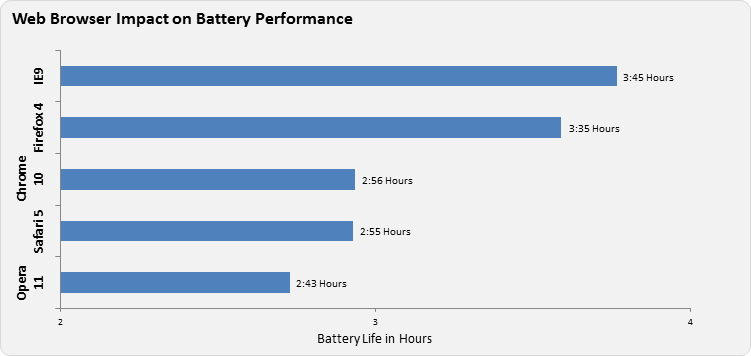IE9 is Most Energy Efficient Browser, So Says MS
Microsoft says that it has the fastest horse.
We all know the benefits of having an energy efficient system. Lower energy requirements mean bills, a smaller carbon footprint, and the immediate benefit of longer battery life.
While the first concern of power management is to have energy efficient hardware, there's always the question of what software does with the hardware. Microsoft posted a blog article on its MSDN highlighting how much it feels that Internet Explorer 9 is the winner when it comes to keeping power draw to a minimum.
Through what appears to be testing using fairly involved and reliable apparatus, Internet Explorer 9 unsurprisingly comes out on top when compared against Chrome 10, Safari 5, Opera 11 and Firefox 4. Mozilla's new browser stayed very close to Microsoft's, making it appear to be the most attractive alternative.
Microsoft monitored system power draw over a few situations: letting the browsers sit at about:blank, at a news site, running HTML5, and running the FishIE demo. In all tests, IE9 was at the top of the pack – though consider the source. Notably absent from the test was anything to do with Adobe Flash.
| Scenario | IE9 | Chrome 10 | Firefox 4 | Opera 11 | Safari 5 |
|---|---|---|---|---|---|
| about:blank | 10.044 W | 7.821 W | 9.570 W | 7.704 W | 8.087 W |
| News Site | 11.042 W | 9.951 W | 10.617 W | 8.757 W | 8.835 W |
| Galactic | 13.506 W | 14.150 W | 14.995 W | 17.742 W | 17.817 W |
| Fish | 21.408 W | 24.078 W | 20.817 W | 21.769 W | 21.260 W |
| Battery Life | 3:45 hrs | 2:56 hrs | 3:35 hrs | 2:43 hrs | 2:55 hrs |
Check out the full test and charts here.
Get Tom's Hardware's best news and in-depth reviews, straight to your inbox.
-
HDmac Its obviously that it loads web pages so slowly that the wi-fi card is primarily inactive, thus saving battery life.Reply -
tentaxlbunga browsing with IE will put you computer to sleep mode oftenly, that why it safe more energy than the competitor.Reply
Of course.. most of the time, you will only see black screen on your monitor. -
thorkle I agree with those sentiments for past builds, but IE9 is very decent. IE9 has a dark history to overcome lolReply -
cjl Clearly, HDmac and tentaxlbunga haven't used IE9. It's actually quite a decent browser. That having been said, I'll stick with FF4 - I've found FF4 with noscript has an amazingly good battery life due to the elimination of all unnecessary flash.Reply -
Benihana That's not bad, this means that I can take a 10 minute hit (out of 3 hours and 45 minutes) of browsing time to use FF and enjoy my browsing experience. Couple that with NoScript (as cjl mentioned) and I'll be computing longer! :)Reply -
opmopadop That last table showing wattage consumed while sitting on certain sites makes absolutely no sense at all. How can "IE9 come out on top of the pack" if it has the highest "W" for two, and middle of the pack for the other two...Reply
I know Im missing something, I just cant figure out watt? -
RolandVet As opmopadop said the table shows IE9 as the greatest power consumer.Reply
If you follow the link to the source you'll see completely different results in which IE9 does have the lowest power consumption. -
RolandVet Further more, the table show the power consumption of Opera 11 in galactic, whilst Opera does not support Galactic.Reply
Tom's hardware, I am disappoint! -
rantoc IE9 is a huge improvement over the IE8, it's almost like it's two differnt browsers with the same interface. It would seem microsoft have rewriten most of the code from scrach and done a good jobb while at it!Reply
Im considering to switch once the IE9 plugins starts to show up!

